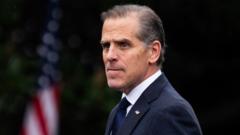The Israeli government's military actions in Gaza are increasingly coming under scrutiny, with allies expressing concern over the humanitarian crisis and allegations of war crimes. Tensions rise as calls for a ceasefire and diplomatic efforts gain momentum amidst the ongoing violence.
Rising International Concern Over Israel's Military Actions Amidst Reports of War Crimes

Rising International Concern Over Israel's Military Actions Amidst Reports of War Crimes
As the conflict in Gaza escalates, allegations of war crimes by Israel grow, prompting a shift in international diplomatic relations and calls for accountability.
The conflict between Israel and Hamas has reached a critical juncture as accusations of war crimes against Israel mount. Following the devastating attacks by Hamas on October 7, 2023, which resulted in the deaths of over 1,200 Israelis, the international community has become increasingly vocal about Israel's military response in Gaza. Claims of war crimes, including the starvation of civilians, indiscriminate killings, and disproportionate military actions, have led to scrutiny on the part of Israel’s traditional allies.
The Israeli Prime Minister, Benjamin Netanyahu, had previously prioritized confronting Iran and strengthening ties with Saudi Arabia, allowing for Qatari funds to reach Gaza. Yet, following the October attacks, his government has faced criticism for failing to establish an inquiry into the security lapses that allowed Hamas to launch their deadly offensive.
Key international figures, including those from the United Nations and various Western nations, have challenged Israel's humanitarian response, especially concerning the aid distribution system implemented after the extensive bombings. A joint statement from foreign ministers from the UK, EU, Canada, Australia, New Zealand, and Japan criticized Israel’s handling of assistance to Gaza’s civilians, highlighting the dire conditions and urgent need for food and medical supplies—a situation that has led to further loss of life.
Amid these escalating tensions, even the staunch support from allies such as former President Donald Trump appears to wane due to Israel's controversial military directives, including strikes against Syria. Growing frustration among allied nations signals a pivotal shift in diplomatic relations, with some calling for stronger actions to address the humanitarian crisis.
The UK Foreign Secretary’s emphatic statements only underscore the widespread call for recognizing a Palestinian state, which has garnered significant support from the UN. Amidst political turmoil within Israel, where Netanyahu faces opposition from his own coalition regarding the war strategy, a potential ceasefire emerges as a glimmer of hope for civilians on both sides.
As international attention focuses on the war crimes allegations and humanitarian crisis, the need for an effective diplomatic resolution becomes pressing. There is a fragile chance for a respite from the violence should a ceasefire be negotiated, but the long-term outlook remains bleak as the region grapples with the complexities of a decades-old conflict.



















